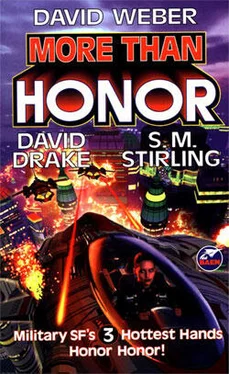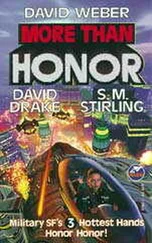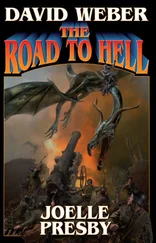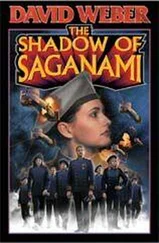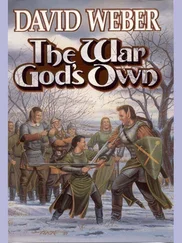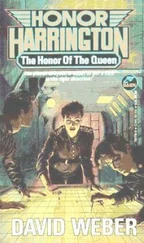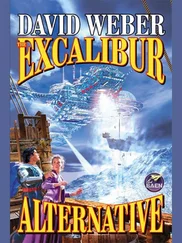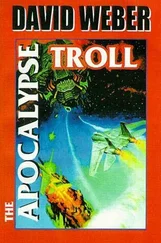David Weber - The Universe of Honor Harrington
Здесь есть возможность читать онлайн «David Weber - The Universe of Honor Harrington» весь текст электронной книги совершенно бесплатно (целиком полную версию без сокращений). В некоторых случаях можно слушать аудио, скачать через торрент в формате fb2 и присутствует краткое содержание. Жанр: Космическая фантастика, на английском языке. Описание произведения, (предисловие) а так же отзывы посетителей доступны на портале библиотеки ЛибКат.
- Название:The Universe of Honor Harrington
- Автор:
- Жанр:
- Год:неизвестен
- ISBN:нет данных
- Рейтинг книги:5 / 5. Голосов: 1
-
Избранное:Добавить в избранное
- Отзывы:
-
Ваша оценка:
- 100
- 1
- 2
- 3
- 4
- 5
The Universe of Honor Harrington: краткое содержание, описание и аннотация
Предлагаем к чтению аннотацию, описание, краткое содержание или предисловие (зависит от того, что написал сам автор книги «The Universe of Honor Harrington»). Если вы не нашли необходимую информацию о книге — напишите в комментариях, мы постараемся отыскать её.
The Universe of Honor Harrington — читать онлайн бесплатно полную книгу (весь текст) целиком
Ниже представлен текст книги, разбитый по страницам. Система сохранения места последней прочитанной страницы, позволяет с удобством читать онлайн бесплатно книгу «The Universe of Honor Harrington», без необходимости каждый раз заново искать на чём Вы остановились. Поставьте закладку, и сможете в любой момент перейти на страницу, на которой закончили чтение.
Интервал:
Закладка:
Sixty percent of the colonists were Western Europeans, with most of the remainder drawn from the North American Federation, the Caribbean, and a very small minority of ethnic Ukrainians. The total expedition consisted of 38,000 adults and 13,000 minor children, and the "rights" to the system had been purchased at auction from the survey firm of Franchot et Fils, Paris, France, Old Earth. "FF" (as it was known) had a high reputation, and its survey ship Suffren had made the same voyage in just twenty years. Suffren's crew had done FF's usual, professional job, although, of course, all data was accompanied by the caution that it would be 650 years out of date when the colonists arrived, and FF sold its rights in the Manticore System to the Manticore Colony, Ltd., for approximately 5.75 billion EuroDollars. As part of the transfer of rights, FF expunged all data on the system from its memory banks, transferring the information to the Federal Government of Earth's World Data Bank's maximum security files. This was a standard safeguard to protect Manticore Colony against the occupation of the planet by later expeditions with faster ships, as it was already apparent that advances in hyper travel might well make such protection necessary, yet it was also recognized that there was no way to guarantee that faster, more capable hyperships would not beat the colonists to Manticore. Accordingly, Roger Winton, President and CEO of Manticore Colony (already elected first Planetary Administrator) opted to establish the Manticore Colony Trust of Zurich.
The MCT's purpose was to invest all capital remaining to the MC after mounting the expedition (something under one billion EuroDollars) and use the accrued interest to watch over the colonists' rights to their new home. It was a wise precaution, for when Jason finally arrived in the Manticore System on March 21, 1416 pd, her crew discovered a modest settlement on the planet they christened Manticore, but it was staffed by MCT personnel who also manned the four small Earth-built frigates protecting the system against claim-jumpers. Indeed, so well had the Trust done in the last six centuries that Manticore found itself with a very favorable bank balance, and the frigates became the first units of the Manticoran System Navy (later the Royal Manticoran Navy). Moreover, the small MCT presence on Manticore included data banks and carefully selected instructors assigned to update the colonists on the technical advances of the last six centuries. This last was a feature even Winton had not anticipated, and he had very good reason to be pleased both with his own decision and the diligence, foresight, and imagination with which a succession of MCT managers had discharged their duties.
It was as well that the colony had such unusual support and off-world financial strength, however, for after almost forty years in which things went perfectly, disaster struck Manticore in 1454.
The initial bid for Manticore had been so high for two reasons. One was that the G0/G2 binary was highly unusual — indeed, unique — in having no less than three planets suitable for human life. The second was that Manticore and Sphinx, the two Earth-like planets orbiting the G0 stellar component, were extremely Earth-like. Although each had its own unique biosphere, survey reports indicated that terrestrial life forms would find it unusually easy to adapt to all three, and so, indeed, it proved. Terran food crops did well, and while the local flora and fauna could not provide all essential dietary elements, much of it was digestible by the terrestrial visitors. Terraforming requirements thus were extraordinarily modest, consisting of little more than the need to seed food crops and selected terrestrial grasses to support imported herbivores. Unfortunately, that very ease of adaptation had a darker side, and Manticore proved one of the very few extra-terrestrial systems to possess microorganisms which could (and did) prey on humans.
The culprit was a virus — or, rather, a small family of viruses — which had been missed by the original survey team. Some virologists argue that it was not, in fact, missed but rather evolved in the six centuries between the initial survey and the arrival of the colonists. Still others suggest that it was actually the mutated descendant of a virus the colonists had brought with them from Old Earth. Whatever the truth of the matter, the virus was deadly, producing a condition analogous to virulent influenza and pneumonia simultaneously in its victims. Worse, it proved resistant to all existing medical technology, and ten years were to pass before a successful vaccine was found.
In that decade, almost sixty percent of the original colonists died. Their Manticore-born children fared better against the disease, experiencing a generally less violent manifestation of it, yet without the cushion provided by the MCT funds on Old Earth and the evolution of the Warshawski Sail hypership, the entire expedition would no doubt have come to grief.
As it was, the colony found itself in urgent need of additional homesteaders. These were recruited from Old Earth (yet another process made much easier by the existence of the MCT), but the original colonists, concerned about retaining control of their own colony, adopted a radically new constitution before opening their doors to emigration.
Roger Winton had been reelected continuously to the post of Planetary Administrator, serving superbly in the position throughout the early settlement period and the plague crisis. He was now an old man (over eighty) whose wife and two Terra-born sons had died of the plague, but he remained vigorous and his Manticore-born daughter Elizabeth showed promise at least equal to his. At fifty-three, she was President of the Board of Directors (effectively vice-president of the colony) and one of Manticore's preeminent jurists. Since she had a large and thriving brood of second-generation Manticoran children and her family had served so outstandingly, a convention of colony shareholders converted the Corporation's elective board into a constitutional monarchy and crowned Roger Winton King Roger of Manticore on August 1, 1471.
It was a post he was to enjoy for only three years before his death, but his daughter succeeded him as Elizabeth I in a smooth and popular transfer of power, and the House of Winton has ruled the Star Kingdom of Manticore ever since. Simultaneously, the surviving "First Shareholders" and their descendants, who held title to vast tracts of land (including most of the richest mineral resources of Manticore and Sphinx) and/or to extra-planetary resources in the Manticore System, acquired patents of nobility to go with their wealth, and the hereditary aristocracy of Manticore was born.
The new wave of immigrants arriving in the wake of the Plague comprised three distinct classes of citizen. Each immigrant received a credit whose value precisely equaled the cost of a second-class passenger ticket from the Solarian League to Manticore. That credit could be converted, at the holder's option, into a land credit on a planetary surface or into a share of equivalent value in any of several orbital and deep space industrial concerns. Most of the new immigrants, faced with virgin planets on which to live, opted for homestead rights there, although some of the sharpest among them made careful investments in the Star Kingdom's industrial infrastructure which later proved of enormous worth, instead.
Any individual capable of paying his own passage received the full credit upon arrival, whereas those incapable of paying their passage could draw upon MCT for a dollar amount equal to their credit to cover the difference between their own resources and the cost of passage. In addition, an immigrant whose resources were greater than the cost of his passage could invest the surplus, paying 50% of the "book" price for additional land and/or investment. The most affluent immigrants thus became "Second Shareholders," with estates (whether in terms of land or industrial wealth) which, in some cases, rivaled those of the original shareholders and entitled them to patents of nobility junior to those of the existing aristocracy. Those immigrants who were able to retain their base land right or perhaps enlarge upon it slightly became "yeomen," free landholders with voting rights beginning one Manticoran year (1.73 Terran Standard Years) after their arrival. Those who completely exhausted their credit to buy passage to Manticore were known as "zero-balance" immigrants and did not become full citizens until such time as they had become well-enough established to pay taxes for five consecutive Manticoran years (8.7 Terran Standard Years). While all Manticoran subjects are equal in the eyes of the law, whether enfranchised to vote or not, there were distinct social differences between shareholders, yeomen, and zero-balancers, and even today there is greater prestige in claiming a yeoman as a first ancestor than in claiming a zero-balance ancestor. And, of course, direct descent from a full shareholder is the most prestigious of all.
Читать дальшеИнтервал:
Закладка:
Похожие книги на «The Universe of Honor Harrington»
Представляем Вашему вниманию похожие книги на «The Universe of Honor Harrington» списком для выбора. Мы отобрали схожую по названию и смыслу литературу в надежде предоставить читателям больше вариантов отыскать новые, интересные, ещё непрочитанные произведения.
Обсуждение, отзывы о книге «The Universe of Honor Harrington» и просто собственные мнения читателей. Оставьте ваши комментарии, напишите, что Вы думаете о произведении, его смысле или главных героях. Укажите что конкретно понравилось, а что нет, и почему Вы так считаете.
